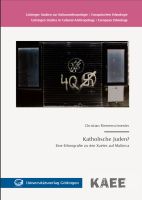Katholische Juden?
Eine Ethnografie zu den Xuetes auf Mallorca
| dc.contributor.author | Riemenschneider, Christian | |
| dc.date.accessioned | 2020-04-15T02:43:30Z | |
| dc.date.available | 2020-04-15T02:43:30Z | |
| dc.date.issued | 2016 | |
| dc.identifier | OCN: 1076645785 | |
| dc.identifier.uri | http://library.oapen.org/handle/20.500.12657/37130 | |
| dc.description.abstract | This ethnography focuses on the descendants of Majorca´s forcedly baptized Jews, the so called Xuetes. Well into the 20th century these catholic Majorcans were marginalized and persecuted as Jews by the majority population. So far the history of the Xuetes was understood as a „past that doesn`t want to go by“, cast as an apology for church and state. This book sheds light on a present where some Xuetes still feel „neither fish nor fowl“. For the first time, Xuetes and Non-Xuetes themselves hold the floor. The result is not a „faith triumphant“ as is the title of a contemporary account on the collective forced baptism but a story of coping with trauma. Theoretical approaches to trauma, taboo, memory and identity facilitate a detailed presentation of identity formation with all its toil, zest and pursuit of knowledge. | |
| dc.language | German | |
| dc.subject.classification | thema EDItEUR::J Society and Social Sciences | en_US |
| dc.subject.other | Xuetes | |
| dc.subject.other | Majorca | |
| dc.subject.other | Jews | |
| dc.title | Katholische Juden? | |
| dc.title.alternative | Eine Ethnografie zu den Xuetes auf Mallorca | |
| dc.type | book | |
| dc.type | book | |
| oapen.identifier.doi | 10.17875/gup2016-956 | |
| oapen.relation.isPublishedBy | ffaff15c-73ed-45cd-8be1-56a881b51f62 | |
| oapen.collection | AG Universitätsverlage | |
| oapen.description.otherlanguage | Die Nachfahren zwangsgetaufter Juden auf Mallorca, die sogenannten Xuetes, stehen im Fokus dieser Ethnografie. Bis in das 20. Jahrhundert wurden diese katholischen Mallorquiner von der Mehrheitsbevölkerung als Juden ausgegrenzt und verfolgt. Beleuchtet wird hier eine Gegenwart, in der sich manche Xuetes immer noch wie „nicht Fisch, nicht Fleisch“ fühlen. Bisher wurde die Geschichte der Xuetes von Historikern zumeist als „Vergangenheit, die nicht vergehen will“ aufgefasst und als Apologie für Kirche und Staat verfasst. In dieser empirischen Studie haben Xuetes und Nichtxuetes erstmals selbst das Wort. Das Ergebnis ist kein „Triumph des Glaubens“, so ein zeitgenössischer Bericht über die kollektive Zwangstaufe, sondern die Geschichte einer Traumabewältigung. Mit theoretischen Ansätzen zu Trauma, Tabu, Erinnerung und Identität werden Identifi kationsprozesse in all ihrer Mühe, Lust und ihrem Erkenntnisbestreben differenziert dargestellt. |

